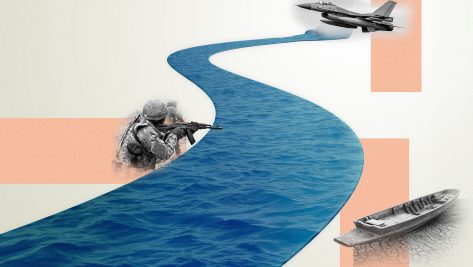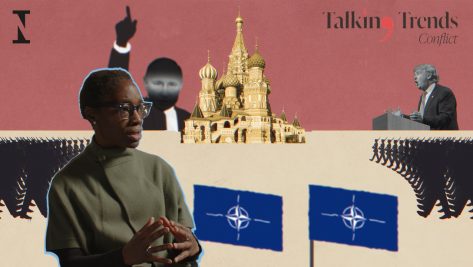International criminal justice is en vogue again. On May 20, 2024, the prosecutor of the International Criminal Court (ICC) requested the Pre-Trial Chamber of the Court to issue arrest warrants in the situations involving the State of Palestine. This request targets the three leaders of Hamas (Yahya Sinwar, Saleh al-Arouri Al-Masri, and Ismail Haniyeh) as well as the Prime Minister of Israel (Benjamin Netanyahu) and the Israeli Minister of Defense (Yoav Gallant).
The request made by the ICC is to charge the Hamas leaders with war crimes and crimes against humanity, including rape, murder, and extermination, allegedly committed on or after October 7, 2023. The Israeli officials face war crimes and crimes against humanity charges for offenses allegedly committed from at least October 8, 2023. The crime of starvation of civilians as a method of warfare features prominently in the prosecutor’s submission.
If accepted by the judges, this case will be the first in the history of the ICC to deal with the crime of starvation. This is significant because the Court’s role is to address individual criminal responsibility while continuously refining international standards pertaining to mass atrocities. For instance, the first case of the ICC – Lubanga – dealt extensively with the issue of child soldiers and the Al Mahdi case is well known for developing the principles for the protection of cultural property in conflict.
In an innovative move, the Prosecutor supported his request to the judges to issue arrest warrants with a written report from a panel of leading international law scholars and practitioners. This unusual approach is designed to provide additional gravitas for the request, making the allegations more difficult to refute. However, critical comments still came in from the representatives of several Western states, including a statement of rejection from the U.S. Secretary of State, Antony Blinken. Objections centered on the lack of moral equivalence between Israel and Hamas and the absence of the Court’s jurisdiction due to the principle of complementarity of the ICC to national jurisdictions.
The complementarity argument is invalid at this stage as it refers to the same person/same conduct scenario. Article 17 of the Rome Statute of the ICC instructs judges to reject a case as inadmissible “unless the State is unwilling or unable genuinely to carry out the investigation or prosecution.” The argument that Israel is both able and willing to carry out its own domestic investigation is therefore not applicable, as domestic activity must concern the same people and the same conduct as those mentioned by the prosecutor.
The German Foreign Ministry and the Austrian Chancellor, as well as some leading modern philosophers, have expressed the view that seeking to equalize Israel and Hamas in this manner is inappropriate. From a legal perspective, this view is addressed quite easily because the ICC deals with individual criminal responsibility of those most responsible for the crimes, regardless of their national or political affiliation.
What is the timeline for the decision to issue arrest warrants?
The next step in the situation in Palestine is for the ICC judges to decide whether to issue arrest warrants. According to Article 58 of the Rome Statute, the Pre-Trial Chamber can issue an arrest warrant at any time after an investigation begins if there are reasonable grounds to believe the person has committed a crime within the Court’s jurisdiction. The arrest must also be deemed necessary to ensure the person’s appearance at trial, prevent obstruction of the investigation, or prevent further crimes (in some cases a summon to appear may suffice). There is no specific timeline for the decision on arrest warrants. The timing may depend on the ability of the Court to secure cooperation, but this consideration proved to be less relevant in the recent high-profile cases.
In the Ukraine situation, the ICC opened its investigation on March 2, 2022, shortly after the February 2022 invasion. A year later, on March 17, 2023, the Pre-Trial Chamber issued arrest warrants for Vladimir Putin and Maria Lvova-Belova (Russian Commissioner for Children’s Rights), alleging responsibility for the war crime of unlawful deportation and transfer of children. Two more arrest warrants were issued in March 2024, for Sergei Kobylash and Viktor Sokolov (senior military and naval commanders, respectively). The judges noted reasonable grounds to believe these individuals committed war crimes by directing attacks at civilian objects and causing excessive incidental harm to civilians.
The arrest warrants in relation to Ukraine were issued rather speedily, especially considering the serious implications of targeting a sitting head of state. In other situations under investigation, the pre-arrest warrant phase often lasts for much longer as the Office of the Prosecutor gathers evidence and political support necessary to execute possible arrest warrants. Issuing an arrest warrant without first securing a solid cooperation and transfer strategy can undermine the Court’s credibility.
How does the ICC differ from any other court dealing with international criminal law?
The first modern international criminal law prosecutions resulting in convictions took place after World War II, in Nuremberg and Tokyo. These trials focused on individual criminal responsibility for mass atrocities committed during the war. The International Military Tribunal (IMT) was established in 1945 in Nuremberg (Germany), pursuant to the London Agreement among the US, the UK, France, and the Soviet Union. Its mandate was to try and punish “the major war criminals of the European Axis” (Article 1 of the Nuremberg Charter). The International Military Tribunal for the Far East (IMTFE), also known as the Tokyo Tribunal, was established a year later, in 1946. This court was modelled after the IMT but it focused on the Far East.
The IMT and the IMTFE tried senior leadership responsible for crimes against peace, war crimes, and crimes against humanity. The IMT tried twenty-two defendants, sentencing eleven to death (including Marshall Göring, a powerful figure in the Nazi party), three people were acquitted, three were sentenced to life imprisonment, and four received shorter sentences due to minimal involvement.
After a lengthy break in the activity of international criminal courts, sometimes attributed to the Cold War, the 1990’s saw the proliferation of the ad hoc international criminal tribunals and other accountability mechanisms dealing with mass atrocities – a trend that Kathryn Sikkink aptly named the justice cascade. The ad hoc tribunals, just like the IMT and the IMTFE, were created to address specific geographical and temporal situations. For instance, the International Criminal Tribunal for the Former Yugoslavia (ICTY) was created by the UN Security Council in 1993 to facilitate prosecutions of international crimes occurring around the time of the dissolution of the Former Yugoslavia.
The ICC, which became operational in 2002 upon the entry into force of the Rome Statute, is distinct in three core ways. Firstly, it is permanent in nature as it was not created to address only one specific situation but rather aiming at comprehensive coverage. Secondly, the court is complementary to domestic jurisdictions, intervening only when national courts are unable or unwilling to prosecute alleged perpetrators. In contract, the ICTY had primary jurisdiction over alleged perpetrators. This means there was no preliminary assessment of the quality of domestic prosecutions.
Thirdly, the ICC is a treaty-based court governed by the Rome Statute. It is technically not part of the United Nations family but it has connections to the UN because the UN Security Council has the power to refer specific situations to the ICC even for nationals of states that are not parties or for the crimes committed in the territory of states that are not state parties to the Rome Statute. The ICC is, however, a distinct international organization that relies on cooperation of the parties to the Rome Statute.
The U.S., Russia, India, China, and Israel are not parties to the Rome Statute, which significantly limits the Court’s universal ambition. Enforcing ICC arrest warrants and other cooperation measures may be more strenuous compared to those executed within the UN system by the ad hoc tribunals like the ICTY.
How does the Court determine when to open an investigation and how does it perform them?
The decision to open an investigation always precedes the issuance of arrest warrants. Starting an investigation at the ICC is a signal for domestic authorities to commence their own investigations and prosecutions if the aim is to establish national primacy over the situation and benefit from the complementarity guarantees.
There are different ways in which potential situations of the relevant criminal conduct reach the Office of the Prosecutor at the ICC. The common route is through filing of various communications by the non-governmental organizations and interest groups. For instance, the European Centre for Constitutional and Human Rights requested the Court to investigate war crimes by the UK forces in Iraq. Based on such submissions, the Office of the Prosecutor may initiate an investigation on its own initiative (proprio motu). Other state parties to the Rome Statute can also refer situations to the Court, as happened in the situation in Ukraine. Finally, the UN Security Council may refer a situation to the ICC when a non-state party is involved, as happened with Libya in 2011. The next step is usually the opening of the preliminary examination phase, which entails collecting additional materials about the situation.
When enough supporting evidence is collected, there are two avenues of action depending on whether there was a referral of the situation to the ICC or a proprio motu action by the Prosecutor based on prior communication(s). In case of referrals, the Prosecutor shall initiate an investigation unless there is no reasonable basis to proceed under the Rome Statute (Article 53). The initiation of an investigation is further simplified in that the Pre-Trial Chamber may only review the determination not to proceed but does not review an affirmative decision to move forward. In contrast, in case of a proprio motu action based on prior communications, the Prosecutor presents a request to the Pre-Trial Chamber for authorization of an investigation. The judges then authorize investigation if there is a “reasonable basis to proceed” (Article 15).
The test for commencing the investigation consists of factual and legal assessment of whether a crime within the jurisdiction of the ICC has been or is being committed, an admissibility test to ensure the case is admissible (i.e., that domestic actors are unable or unwilling to conduct genuine investigations and prosecutions (Article 17), and considerations of the “interests of justice” (taking into account the gravity of crimes and the interests of victims).
The situation in Palestine followed the simplified track for authorizing investigations pursuant Article 53 of the Rome Statute because it was officially referred to the ICC by the State of Palestine in 2018. This action was made possible because Palestine had acceded to the Rome Statute three years earlier, in 2015, by depositing its instrument of accession with the UN Secretary-General. On December 20, 2019, ICC Prosecutor Fatou Bensouda announced that her office had determined there was reasonable basis to proceed with an investigation into alleged Rome Statute crimes committed in the situation in Palestine. The investigation is therefore currently open.
There was no express need for an authorization from the Pre-Trial Chamber because of the referral route of the process. However, the Prosecutor requested the judges clarify the ICC’s territorial jurisdiction in this case, given the unique and highly contested legal and factual issues attaching to this situation (e.g., the contested nature of Palestinian statehood).
On February 5, 2021, the Pre Trial Chamber I of the ICC determined by majority that the Court may exercise its criminal jurisdiction in the situation in Palestine and that the territorial scope extends to Gaza and the West Bank, including East Jerusalem. In this majority ruling, the judges stressed that they were not determining whether Palestine fulfilled the requirements of statehood under public international law, but they ruled solely on the scope of the Court’s territorial jurisdiction for the purposes of the Rome Statute.
What are the implications of issuing arrest warrants charging Israeli top officials?
Issuing arrest warrants charging Israeli top officials may have serious implications for the future of the ICC. The Court has strained relationship with the U.S., which is also not a state party to the Rome Statute. The ICC receives no funding from the U.S. but depends on it politically and logistically. For instance, the ICC Office of the Prosecutor partners with Microsoft and intends to engage its help in fostering AI and data storage capabilities at the ICC. Having physical storage of the data on the U.S. territory may prove sensitive given current developments.
The importance of having the U.S. as an ally for the ICC can be seen in the way the situation of Afghanistan was handled by the Court. The ICC’s probe into crimes allegedly committed by the CIA and US military in Afghanistan resulted in a severe backlash in the U.S. and the former Prosecutor of the ICC being banned from entry into the U.S. The executive order issued by the previous administration also mentioned other sanctions against the ICC in response to its decision to investigate crimes potentially committed by U.S. citizens in Afghanistan. One may suggest that this pressure prompted the current Prosecutor of the ICC to drop charges against the U.S. personnel while retaining the charges against the Taliban. The Prosecutor chose to “deprioritize” the focus on the U.S. in an investigation of war crimes in Afghanistan, stating that the worst crimes were committed by Daesh and the Taliban.
The Prosecutor further noted in his submission that it was not in the “interests of justice” to pursue investigations against the US personnel. This decision was viewed by some as bending to political pressure and as paving the way for President Biden to lift the sanctions previously imposed on the ICC. The relationship between the ICC and the U.S. further improved as President Biden ordred his administration to begin sharing evidence of alleged Russian war crimes in Ukraine with the Court in July last year.
Charging top Israeli officials would test the newly established predisposition of President Biden to the ICC. If the U.S. administration does not recognize the legitimacy the ICC’s intervention, the allegations of double standards may easily surface. If the U.S. administration eventually accepts the validity of possible arrest warrants, there will be certain expectations of cooperation in sharing information regarding potential crimes committed by the leaders of the country that U.S. considers to be a close ally. The same considerations would apply to the European allies of Israel.
The impact of the arrest warrants may be even stronger in the case of European states, as all EU member states are signatories to the Rome Statute and would therefore be legally obligated to execute the arrest warrant should Prime Minister Netanyahu choose to travel to any of these countries. One of the practical implications of issuing an arrest warrant is the severe limitation of mobility and execution official functions. Such limitations can, in turn, influence the Prime Minister’s ability to negotiate a ceasefire and make other arrangements related to the conflict. On the other hand, the Prosecutor’s calculus may be to place sufficient pressure on Israeli and Hamas leadership to end to current hostilities. The effectiveness remains to be seen because, in a pre-emptive statement on social media, Mr. Netanyahu said that Israel would “never accept any attempt by the ICC to undermine its inherent right of self-defense.”
Finally, the arrest warrants could backfire and undermine the Court’s legitimacy. This would certainly be the case if the European allies of Israel choose to ignore the arrest warrants issued by the ICC and refuse to cooperate with the Court. Such a stance may be interpreted outside of the Western-centric world as hypocrisy with different rules and standards of scrutiny applying to different situations. What is at stake here is the universalist agenda of the ICC.
© IE Insights.











